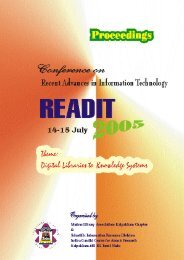READIT-2007 - Indira Gandhi Centre for Atomic Research
READIT-2007 - Indira Gandhi Centre for Atomic Research
READIT-2007 - Indira Gandhi Centre for Atomic Research
You also want an ePaper? Increase the reach of your titles
YUMPU automatically turns print PDFs into web optimized ePapers that Google loves.
their scholars to post their articles on institutes digital libraries. Highwire Press maintains<br />
largest open access archive of scientific and medical journals and Pubmed Central<br />
maintains life science journal article access. There are subject repositories like arXiv.org<br />
<strong>for</strong> Physics, Mathematics, Computer Science and Quantitative Biology, NASA<br />
Astrophysics Data System (ADS) <strong>for</strong> astronomy and astrophysics. NCSTRL provides<br />
access to over 20,000 technical reports in computer science.<br />
Search engines <strong>for</strong> scholarly in<strong>for</strong>mation: There are several free search engines<br />
like Google Scholar, Scirus, CiteSeer, and getCITED available which will index<br />
scholarly literature. Some of these tools have functionality similar to subscription-based<br />
tools like Scopus and Thomson ISI's Web of Science. Google Scholar provides links to<br />
freely available literature on the web and also citation in<strong>for</strong>mation.<br />
Web 2.0 technologies and services: Second generation of web-based<br />
communities and hosted services — such as social-networking sites, wikis, blogs and<br />
RSS are changing the way users collaboration and sharing and became very popular.<br />
Wikipedia was started by Jimmy Wales in 2001 and now has more than 2.5 million<br />
entries in 10 languages and became one of the popular sites. Now it extended to<br />
Wikibooks, free open-source textbooks, and Wiktionary, an open-source dictionary,<br />
among other creations.<br />
3. IMPACT ON LIBRARIES<br />
We can say today that users use Google or other services be<strong>for</strong>e coming to<br />
Library. In the pre-internet world, librarians/libraries have central place in their<br />
in<strong>for</strong>mation requirements which now became one of the option <strong>for</strong> users in this internet<br />
world. OCLC report, College Students’ Perceptions of Libraries and In<strong>for</strong>mation<br />
Resources, indicates that most undergraduates either do not visit their campus library or<br />
do so only one or two times per year.<br />
Pressures from funding institutions, reduction in budgets, operational and<br />
financial per<strong>for</strong>mance measures increased use of internet by users are driving librarians to<br />
promote, advertise and sell library services and move beyond from free services. Let us<br />
look at the ways how these roles changed. To provide reference services, librarians<br />
moved from searching the internal library collections and one or two paid databases to<br />
online databases, hundreds of journals, online catalogs of other libraries and vast worldwide<br />
web. Availability of new tools, better access made reference queries complex.<br />
People are finding simple in<strong>for</strong>mation using websites and databases provided on their<br />
computers, <strong>for</strong> example; price of a book, address of a company and so on. Earlier<br />
librarians tend to provide subject bibliographies or reading lists to users. Now they started<br />
creating WebPages with links of sites that user’s can use. Internet made sharing of<br />
cataloging of data easier and also ability to create different catalogs <strong>for</strong> different kind of<br />
audience. In this internet world, where knowledge is treated as commodity and priced,<br />
Libraries can change their paths and play important role in few areas. Given below are<br />
some of the ways <strong>for</strong> the same:<br />
206

















